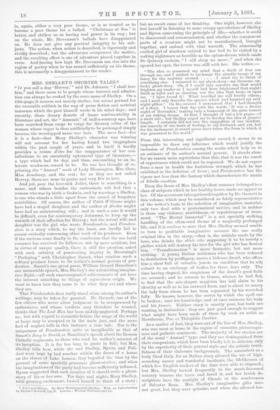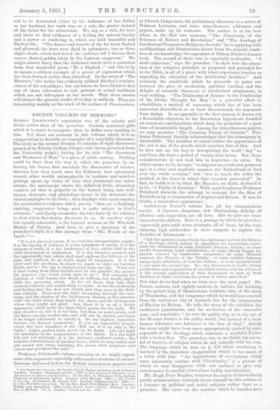MRS. SHELLEY'S SHORTER TALES.* "Is' you call a dog Hervey,"
said Dr. Johnson, "I shall love him," and there seem to be people whose interest and admira- tion can always be evoked by the mere name of Shelley. On a title-page, it secures not merely shelter, but actual perusal for the execrable rubbish in the way of prose fiction and metrical nonsense which the poet himself wrote in his salad days ; and recently, those dreary deserts of inane sentimentality in literature and art, the "Annuals" of half-a-century ago, have been searched from verge to verge for literary relics of the woman whose vogue is thus artificially to be prolonged simply because the worshipped name was hers. The mere fact—for it is a fact—that Mary Shelley's character was winning will not account for her having found two biographers within the past couple of years, and in itself it hardly provides a raison cl'etre for the reappearance of her con- tributions to an essentially ephemeral typo of literature,— a type which had its day, and then, succumbing to an in- herent weakness, ceased to be. No one has thought of re- printing the " Annual " work of Lady Blessington, Mrs. Gore, Miss Jewsbury, and the rest ; for as they are not called Hervey, there are none to praise and very few to love.
And yet, pace the love-sick Juliet, there is something in a name, and others besides the enthusiasts will feel that a woman who was by birth a Grodwiu, and by marriage a Shelley, is one who stands a little apart from the crowd of forgotten notabilities. Of course, the author of 'Caleb Williams might have had a stupid daughter, and the author of Alastor might have had an uninteresting wife ; and in such a case it would be difficult, even for contemporary Johnsons, to keep up the warmth of their affection for Hervey; but the actual wife and daughter was the girl who wrote Frankenstein, and Franken- stein is a story which, to say the least, can hardly fail to arouse curiosity concerning other work of its producer. Even if the curious come finally to the conclusion that the one lurid romance has survived its followers not by mere accident, but in virtue of unique quality, there is still the question, asked with such subtlety of penetrating inquiry in Browning's "Parleying" with Christopher Smart, what relation such a solitary product bears to its author's normal powers of pro- duction. Smart's one great poem, William Gerard Hamilton's one memorable speech, Mrs. Shelley's one astonishing imagina- tive flight,—all such unaccompanied achievements of art have the interest attaching to things of mysterious origin. We want to know how they came to be what they are and where they are.
That Frankenstein does really stand alone among its author's writings, may be taken for granted. Dr. Garnett, one of the few editors who never allow judgment to be overpowered by enthusiasm, and whose verdicts may therefore be trusted, thinks that The Last Man has been unduly neglected. Perhaps so ; but with regard to romantic fiction, the usage of the world at large may be accepted as in the main just, and the mere fact of neglect tells in this instance a true tale. Nor is the uniqueness of Frankenstein quite as inexplicable as that of Smart's Song to David, or Hamilton's speech about the Roman Catholic regiments, to those who read its author's account of its inception. It is far too long to quote in full; but Mrs. Shelley tells bow, while she and Shelley, Byron, and Poli- dori were kept by bad weather within the doors of a house on the shores of Lake Leman, they beguiled the time by the perusal of some specially gruesome ghost-stories ; and when the imaginations of the party had become sufficiently inflamed, Byron suggested that each member of it should write a ghost- story of his or her own. For days and nights Mary Shelley, with growing excitement, busied herself to think of a story ; * Tula and Stories. By Mary Wollstoneeraft Shelley. With an Introduction by Richard Garnett, LL.D. London : William Paterson and Co. but no result came of her thinking. One night, however, she lost herself in listening to some creepy speculations of Shelley and Byron concerning the principle of life,—whether it could be discovered and communicated, and whether the component parts of a, creature might not be manufactured, brought together, and endued with vital warmth. The abnormally excited girl of nineteen retired to her bed to be visited by a waking nightmare as horrible as the opium-dream which made. De Quincey exclaim, "I will sleep no more ; " and when she opened her eyes, the terror was still with her. She writes :— "The idea so possessed my mind that a thrill of fear ran through me, and I wished to exchange the ghastly image of my fancy for the realities around I must try to think of something else. I recurred to my ghost-story—my tiresome, un- lucky ghost-story. Oh, if I could only contrive one that would frighten my reader as I myself had been frightened that night! Swift as light and as cheerino•. was the idea that broke in upon
me. have found it ! What terrified me will terrify others ; and I need only describe the spectre which had haunted my mid- night pillow.' On the morrow I announced that I had thought of a story. I began that day with the words, It was a dreary night of November,' making only a transcript of the grim terrors of my waking dream. At first I thought of but a few pages—of a short tale ; but Shelley urged me to develop the idea at greater length. I certainly did not owe the suggestion of one incident., nor scarcely of one train of fooling, to my husband, and yet, but for his incitement, it would never have taken the form in which it was presented to the world."
From this interesting and significant record, it seems to us impossible to draw any inference which would justify the inclusion of Frankenstein among the works which help us to an estimate of its author's normal powers. It stands alone for no reason more mysterious than this, that it was the result of experiences which could not be repeated. We do not expect from a man in health the factitious strength which he has exhibited in the delirium of fever ; and Frankenstein has the vigour not less than the fantasy which characterises the mania of febrile emotion.
Even the theme of Mrs. Shelley's first romance belonged to a class of subjects which in her healthy hours made no appeal to her. Of the seventeen tales gathered together by Dr. Garnett in this volume, which may be considered as fairly representative.
of the writer's taste in the selection of imaginative material, only two deal with a preternatural motive, and in neither.
is there any violence, morbidness, or repulsiveness of treat- ment. "The Mortal Immortal" is a not specially striking.
handling of the often-used theme of a magically prolonged life, and it is curious to note that Mrs. Shelley seemed unable to turn to profitable imaginative account the one really original idea in the story,—that is, the mistake made by the hero, who drinks the elixir vito supposing it to be merely a philtre which will destroy his love for the girl who has flouted him. " Transformation " is more fantastic, but not more striking. A young Italian nobleman who has been reduced to destitution by profligacy, meets a hideous dwarf, who offers him a chest full of valuable jewels on condition that he will submit to an exchange of bodies for three days only. The time having elapsed, his suspicions of the dwarf's good faith arc aroused ; and he returns to Genoa, whence he had fled, to find that the mis-shapen magician has laid claim to his identity as well as to his outward form, and is about to marry the lady from whom he has been separated by his wretched folly. He knows, however, the secret by which the spell can be broken ; uses his knowledge, and at once recovers his body and his fiancee. Neither story is exactly poor, but both are wanting in distinction : they are just good enough to suggest what might have been made of them by such an artist as Hawthorne, Poe, or Theophile Gautier.
As a matter of fact, they were out of the line of Mrs. Shelley, who was most at home in the region of romantic picturesque- ness and. pathetic sentiment. The majority of her stories are of the usual "Annual" type, and they are distinguished from their companions, which have been kindly left to oblivion, only by the superiority of their general style and the artistic truth- fulness of their elaborate backgrounds. The annualists as a body liked Italy, for an Italian story allowed the use of high- sounding names and wonderful incidents, the lifelikeness of which few English readers of the time were able to impeach; but Mrs. Shelley turned frequently to the much-favoured country because she knew and loved it, and her lavish de- scriptions have the sunlight of Claude or the sombreness of Salvator Rosa. Mrs. Shelley's imaginative gifts were not great, but they were genuine, and when she allowed her-. self to be dominated either by the influence of her father or her husband, her work was, as a rule, the poorer instead of the richer for the submission. We say as a rule, for here and there we find evidences of a feeling for natural beauty and a power of rendering it, which are both beautiful and Shelley-like. "The domes and turrets of the far town flashed and gleamed, the trees were dyed in splendour; two or three slight clouds, which had drunk the radiance till it became their essence, floated golden islets in the lustrous empyrean." We might almost fancy that the italicised words were a quotation from that wonderful poem, "To a Skylark ; " and this is by no means a solitary example of a power of expression which has been learned rather than inherited. In the story of "The Mourner," the writer has evidently utilised Shelley's reminis- cences of his schooldays; but elsewhere we have failed to find any of those references to real persons or actual incidents which are not infrequent in her novels. That these stories will attract the general reader of to-day, is unlikely. They are interesting mainly as the work of the author of Frankenstein.















































 Previous page
Previous page